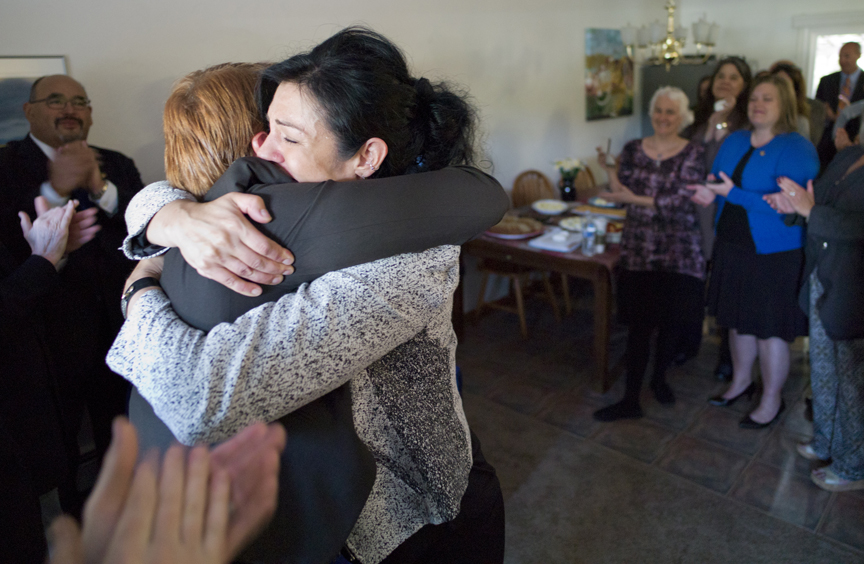Gov. Bill Walker organized the signing ceremony for Senate Bill 91, but Kara Nelson and Kris Sell seized the moment.
After the speeches, Juneau Police Department Lt. Sell offered Haven House director Nelson a medallion with a phrase attributed to Joan of Arc: “I’m not afraid. I was born for this.”
The two embraced, and Nelson wiped away a tear.
On Monday morning, Walker signed into law SB 91, which institutes sweeping reforms to the way the state sentences criminals. Broadly, nonviolent offenders and those arrested for simple possession of drugs will receive lighter sentences intended to improve the odds that they will return to society instead of reoffending and returning to prison.
If implemented successfully, the bill will reduce the state’s prison population by 13 percent by 2024 and save more than $320 million in the process, but cost savings wasn’t its primary goal, Walker said.
“It’s not just about money,” he said during the ceremony. “It’s about people. It’s about people’s lives.”
Walker said the state’s existing prison system is putting people into a cycle of imprisonment they can’t escape from. He offered an analogy: “We were a factory ─ and I don’t like to refer to prison as a factory ─ and two-thirds of what we sent out got recalled.”
Nelson, director of Haven House, is one of the people that the reformed program will rely upon. Haven House is a transition home for women recently released from prison.
“Nobody hasn’t been affected by incarceration, by addiction. This is really incredible,” Nelson said of the bill.
[One year after opening, transitional house Haven Home thrives as neighbors still object]
More than 50 people crowded into the Haven House living room, which quickly became stuffy, heated and humid, but no one appeared to mind. Most attendees had some role in getting to SB 91 to this moment.
“There’s a lot of people that did a lot of work to make this day happen, and my role is humbly minimal,” Walker said.
Some in attendance members of the Alaska Criminal Justice Commission, a panel that has been meeting since 2014 to suggest the changes that ultimately became SB 91.
Former Alaska Supreme Court justice Alexander Bryner is a member of the commission. On Monday morning, he recalled that the commission’s first meetings were “bleak.”
“I just think it’s kind of a miracle that all of this has happened,” he said.
In the end, however, commission members and legislators agreed that Alaska’s system of criminal accountability was broken. Sen. John Coghill, R-North Pole and a member of the commission, said the new approach will ensure the “scarlet letter isn’t a permanent tattoo.” He and others agreed that Monday’s signing ceremony isn’t the end of the process: it’s just the end of the beginning.
More than $100 million will be invested into rehabilitation programs, and the criminal justice commission will continue to meet to make suggestions on changes and fixes to the system.
By and large, however, the job of making sure the reforms work will fall on organizations like Haven House.
“We’ll do the rest,” Nelson said.
• Contact reporter James Brooks at james.k.brooks@juneauempire.com.
Related stories on SB 91:
Senate reshapes Alaska’s criminal landscape
Empire Editorial: Pass the crime bill
Related stories:
Police ID man found in Mendenhall wetlands, search for his sister begins
Cobbling together funding for Housing First
Mother of ‘Alaskan Bush People’ star tries to reconnect with estranged daughter

